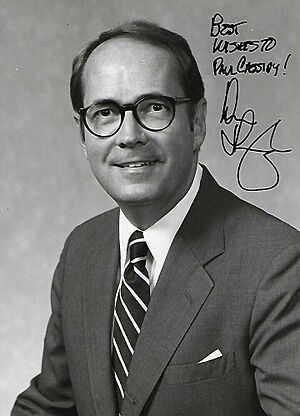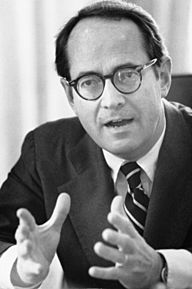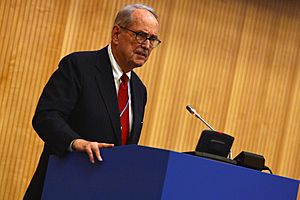Dick Thornburgh facts for kids
Quick facts for kids
Dick Thornburgh
|
|
|---|---|
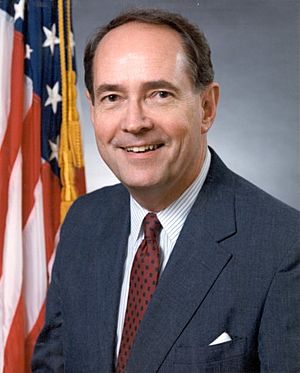 |
|
| 76th United States Attorney General | |
| In office August 12, 1988 – August 15, 1991 |
|
| President | Ronald Reagan George H. W. Bush |
| Preceded by | Edwin Meese |
| Succeeded by | William Barr |
| 41st Governor of Pennsylvania | |
| In office January 16, 1979 – January 20, 1987 |
|
| Lieutenant | William Scranton III |
| Preceded by | Milton Shapp |
| Succeeded by | Bob Casey Sr. |
| United States Assistant Attorney General for the Criminal Division | |
| In office 1975–1977 |
|
| President | Gerald Ford |
| Preceded by | Henry E. Petersen |
| Succeeded by | Benjamin Civiletti |
| United States Attorney for the Western District of Pennsylvania | |
| In office 1969–1975 |
|
| President | Richard Nixon Gerald Ford |
| Preceded by | Gustave Diamond |
| Succeeded by | Blair Griffith |
| Personal details | |
| Born |
Richard Lewis Thornburgh
July 16, 1932 Pittsburgh, Pennsylvania, U.S. |
| Died | December 31, 2020 (aged 88) Verona, Pennsylvania, U.S. |
| Political party | Republican |
| Spouses | Ginny Hooton (died 1960) Ginny Judson
(m. 1963) |
| Children | 4 |
| Education | Yale University (BS) University of Pittsburgh (LLB) |
Richard Lewis Thornburgh (born July 16, 1932 – died December 31, 2020) was an important American lawyer and politician. He was a member of the Republican Party. He served as the 41st governor of Pennsylvania from 1979 to 1987. Later, he became the United States Attorney General from 1988 to 1991. Before these big jobs, he was a U.S. Attorney for Western Pennsylvania.
Contents
Growing Up and School
Richard Thornburgh was born in Pittsburgh, Pennsylvania, on July 16, 1932. His father, Charles Garland Thornburgh, was an engineer. Richard went to Mercersburg Academy and then Yale University, where he earned an engineering degree in 1954.
He later studied law at the University of Pittsburgh School of Law. He finished his law degree in 1957. He also worked as an editor for the school's Law Review magazine.
In 1959, he joined a law firm in Pittsburgh called Kirkpatrick & Lockhart.
Family Life and Advocacy
Thornburgh first married Ginny Hooton. They had three sons: John, David, and Peter. Sadly, Ginny Hooton died in a car accident in 1960. Their youngest son, Peter, was left with physical and intellectual disabilities from the accident.
In 1963, Thornburgh married Ginny Judson. They had another son named Bill in 1966. Ginny Judson Thornburgh was a former schoolteacher. She became a strong supporter for people with disabilities.
Because their son Peter had a disability, the Thornburgh family became very interested in helping others with disabilities. They were even named "Family of the Year." Both Ginny and Dick Thornburgh spoke at a special conference about disabilities at the Vatican in Rome in 1992.
As the U.S. Attorney General, Thornburgh played a big part in creating the Americans with Disabilities Act. This important law helps protect the rights of people with disabilities.
His Career in Public Service
U.S. Attorney
In 1969, President of the United States Richard Nixon chose Thornburgh to be the U.S. Attorney for Western Pennsylvania. In this role, he became known for being tough on organized crime. He also took Pittsburgh steel companies to court for polluting rivers in 1971. This was before many major environmental laws existed.
In 1975, President Gerald Ford appointed him as the Assistant Attorney General for the Justice Department's Criminal Division. After two years, Thornburgh returned to practicing law in Pittsburgh.
Governor of Pennsylvania
In 1978, Thornburgh decided to run for governor of Pennsylvania. He won the primary election against several other candidates. Even though more people in Pennsylvania were Democrats, Thornburgh and his running mate, Bill Scranton, won the election. Their victory was partly because Thornburgh promised to fight government corruption.
Thornburgh and Scranton were reelected in 1982. He was the first Republican to serve two terms as governor of Pennsylvania.
Responding to Three Mile Island
A big challenge during his time as governor was the Three Mile Island accident in 1979. This was a serious nuclear power plant accident near Harrisburg, Pennsylvania. Governor Thornburgh was seen as a calm leader during this time. He helped manage the emergency response and worked to get money for the cleanup efforts.
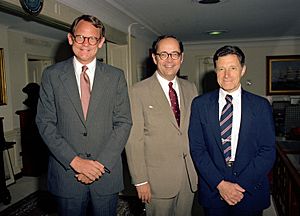
Economic Growth and Education
Thornburgh was praised for helping Pennsylvania's economy grow. He started programs like the Ben Franklin Partnership. He also worked on welfare reform. When he became governor, Pennsylvania had one of the highest unemployment rates. When he left office, it was one of the lowest. About 50,000 new businesses and 500,000 new jobs were created during his time.
He also brought all of Pennsylvania's state-owned colleges and universities together into one system. He created the Governor's Schools, which were summer programs for talented high school students.
In 1987, he was made an honorary Pennsylvania State Police Trooper. After leaving office, he worked at the John F. Kennedy School of Government at Harvard University.
U.S. Attorney General
In 1988, President Ronald Reagan appointed Thornburgh as the United States Attorney General. He continued in this role when President George H. W. Bush took office. He served as Attorney General for three years, from 1988 to 1991.
As Attorney General, he strongly fought against white-collar crime. This means crimes committed by business people, like fraud. The Justice Department got a record number of convictions for people involved in financial crimes. Thornburgh also worked closely with law enforcement agencies around the world. He oversaw the major environmental lawsuit that came from the Exxon Valdez oil spill in 1989.
Thornburgh worked in the Justice Department under five different presidents.
Later Political Life
In 1991, Thornburgh resigned as Attorney General to run for a U.S. Senate seat in Pennsylvania. This seat became open when Senator John Heinz died in a plane crash. Many people expected Thornburgh to win, but he was defeated by Democrat Harris Wofford.
After this, Thornburgh worked for the United Nations from 1992 to 1993. He was in charge of personnel, budget, and money matters. He wrote a report that suggested ways to make the UN's programs more efficient.
Later Life and Legacy
After 25 years in public service, Thornburgh returned to private law practice at K&L Gates. This was the same law firm he joined in 1959.
In 2002, he was asked to investigate the WorldCom bankruptcy case. His report criticized the accounting firm Arthur Andersen and the bank Citigroup. He concluded that they helped WorldCom executives commit fraud.
In 2004, he helped investigate the "Rathergate" controversy for CBS news. Later, he represented Dr. Cyril Wecht, a forensic pathologist, who faced federal charges. All charges against Dr. Wecht were dismissed in 2009.
Thornburgh also worked as a consultant for the United Nations and the World Bank. He helped them fight fraud and corruption around the world.
He wrote a book in 2007 called "Puerto Rico's Future: A Time to Decide." In the book, he argued that Puerto Rico's status as a U.S. territory should change. He believed it was a leftover from colonialism.
Thornburgh traveled to over 40 countries and met with many world leaders. He also observed elections in Russia.
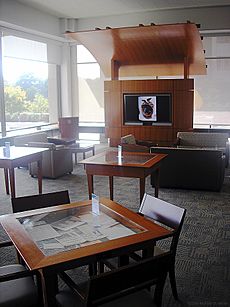
Dick Thornburgh passed away on December 31, 2020, at the age of 88.
Dick Thornburgh Papers
His important papers and documents, known as the Dick Thornburgh Papers, were given to the University of Pittsburgh in 1998. They are kept in the university's Hillman Library. The university also created the Dick Thornburgh Forum in Law and Public Policy in his honor.
In 2019, Thornburgh retired from K&L Gates, the only private law firm he ever worked for. This was 60 years after he first joined the firm.


